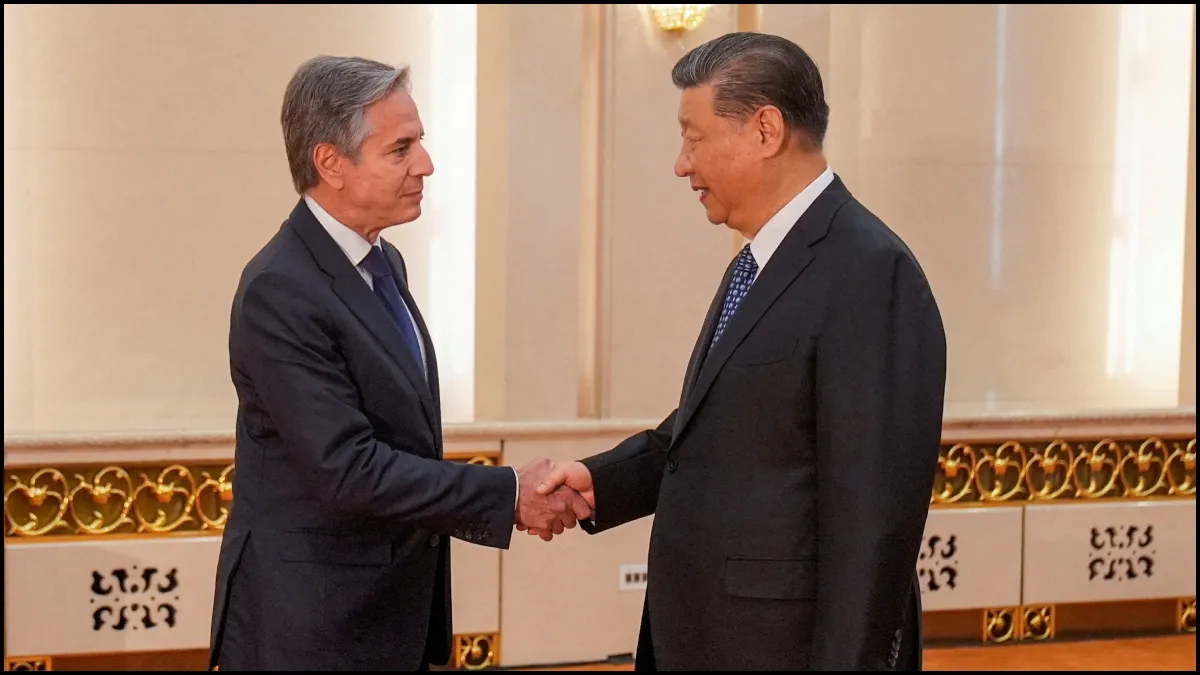Blinken meets Chinese President Xi as recent tensions threaten to sour US-China relations
During an earlier meeting with Chinese foreign minister Wang Yi, Blinken raised concerns about China's support for Russia's military. Despite improvement in bilateral ties, the US heightened tensions with China by passing a foreign aid package, part of which provides defence aid to Taiwan.

Beijing: US Secretary of State Antony Blinken met with Chinese President Xi Jinping on Friday during his visit to the country as Washington and Beijing sparred over a multitude of regional and global issues. During his visit to Beijing earlier, the top US diplomat had raised concerns about China's support for Russia's military, one of the several issues threatening to sour the recent improvement in US-China relations.
Blinken was meeting with Xi in Beijing after holding talks with Chinese Foreign Minister Wang Yi and Public Security Minister Wang Xiaohong, amid increased talks between the two of the world's largest militaries. Despite a marked improvement in bilateral ties, differences between the US and China have also grown especially surrounding the issue of Russia, Taiwan and production capacities.
Before meeting the Chinese President, Blinken and Wang underscored the importance of keeping lines of communication open, but they also lamented that divisions were becoming more serious in nature. These divisions were heightened as US President Joe Biden signed a massive foreign aid bill that allocated $8 billion for countering Chinese threats in the Indo-Pacific.
US officials have warned that Chinese companies are helping Russia's weapons industry with an unprecedented buildup that has helped to turn the tide of the war in Ukraine. Bigger machine tool imports from China have helped Russia increase its ballistic missile production, say officials. They have warned that such assistance risks hurting the broader bilateral relationship. China maintains that it has not provided weaponry to any party, adding that it is "not a producer of or party involved in the Ukraine crisis".
Recent differences between US and China
As the pair settled into their opening session, Wang told Blinken that the "giant ship" of the China-US relationship had stabilised, "but negative factors in the relationship are still increasing and building. And the relationship is facing all kinds of disruptions. China's legitimate development rights have been unreasonably suppressed and our core interests are facing challenges."
Blinken replied that "active diplomacy" was needed to move forward with the agenda set by President Joe Biden and President Xi Jinping when they met in San Francisco in November. "There's no substitute in our judgement for face-to-face diplomacy," he said, adding that he wanted to ensure that "we're as clear as possible about the areas where we have differences, at the very least to avoid misunderstandings, to avoid miscalculations".
US State Department officials signalled ahead of the sessions that China's support for Russia would feature strongly, saying that Washington is prepared to act against Chinese companies that have been helping retool and resupply Russia's defence industry. Despite increasing high-level exchanges and working groups tackling issues such as enhanced military communication and global trade, stark differences remain.
US must not cross 'red lines', warns China
Wang laid out China's position, saying the US must not step on "red lines" covering sovereignty, security and development interests - an apparent reference to Taiwan, the democratically-governed island that China claims as its own, and the disputed South China Sea. Beijing claims Taiwan is a purely internal matter and the most important and sensitive issue in relations with the United States.
“Should China and the United States keep in the right direction of moving forward with stability or return to a downward spiral?” he asked. “This is a major question before our two countries and tests our sincerity and ability.” Wang also outlined Chinese complaints about US policies surrounding the South China Sea, Taiwan, human rights and more.
“China's legitimate development rights have been unreasonably suppressed and our core interests are facing challenges,” he said. “China's concerns are consistent. We have always called for respect of each other's core interests and urge the United States not to interfere in China's internal affairs, not to hold China's development back, and not to step on China's red lines on China's sovereignty, security, and development interests.”
The State Department said later that Blinken and Wang had “in-depth, substantive, and constructive discussions about areas of difference as well as areas of cooperation” and made clear that Blinken had stood his ground on US concerns. Blinken “emphasised that the US will continue to stand up for our interests and values and those of our allies and partners, including on human rights and economic issues,” State Department spokesperson Matthew Miller said in a statement.
“I look forward to these discussions being very clear, very direct about the areas where we have differences and where the United States stands, and I have no doubt you will do the same on behalf of China,” Blinken told Wang.
(with inputs from agencies)
ALSO READ | Putin announces plans to visit China in May on his first foreign trip since March elections